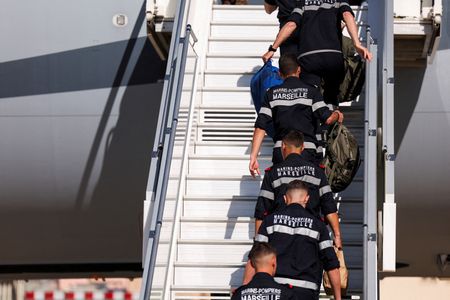By Kirsty Needham and Michel Rose
SYDNEY/PARIS (Reuters) – French President Emmanuel Macron’s ambitions to deepen French influence in the Pacific, where China is expanding its security ties, could be put at risk by the heavy-handed response to civil unrest in New Caledonia, Pacific analysts and officials said.
Deadly riots erupted this week among indigenous Kanak, after Paris changed voting rules to allow more French residents to join electoral rolls in the Pacific territory. The violence and the arrival of hundreds of police from Paris are reigniting regional sensitivities over colonialism.
Australian National University Pacific analyst Graeme Smith said a crackdown by French police in Noumea could bolster China’s weaponisation of the colonial legacy of Western nations in the Pacific – which includes French and American nuclear testing.
“It will play very well because China has been discovering some of the colonial history of the Pacific,” he said.
Beijing has pushed to deepen its security ties in the Pacific Islands, strategically located between the United States and Asia, with mixed success.
After striking a security pact with the Solomon Islands in 2022 that alarmed Washington, Beijing failed to reach a Pacific-wide trade and security deal.
China shifted attention and financial support to a sub-group, the Melanesian Spearhead Group, formed in 1986 to back decolonisation for Melanesian countries still under colonial rule, most notably the Front de Liberation Nationale Kanak et Socialiste (FLNKS) of New Caledonia.
Its members, Papua New Guinea, Fiji, Vanuatu and Solomon Islands, are at the centre of a contest for influence between China and the U.S. and its allies, including Australia and France.
In July, Macron made the first visit to Vanuatu by a French leader since it gained independence from France and Britain in 1980, warning in a speech against China’s “new imperialism”.
China is Vanuatu’s largest external creditor, and its then prime minister was ousted by lawmakers the next month, in part for abandoning Vanuatu’s non-aligned foreign policy.
Melanesian Spearhead Group leaders met in August to consider security cooperation with China, on which no decision has been made.
On Thursday, Vanuatu Prime Minister Charlot Salwai issued a statement as the group’s chairman, criticising France for the riots and demanding it drop the electoral reform, which will dilute the Kanak vote in New Caledonia.
“Vanuatu is fuelled,” said one Vanuatu lawmaker, who declined to be identified, pointing to anti-colonial sentiment on social media in response to the deaths of three Kanak youths.
REGIONAL SECURITY ISSUE
Electoral reform is the latest flashpoint in a decades-long tussle over France’s role in mineral-rich New Caledonia, which lies some 1,500 km (930 miles) east of Australia.
France annexed the island in 1853 and gave the colony the status of overseas territory in 1946. It has long been rocked by pro-independence movements.
FLNKS external relations adviser Jimmy Naouna told Reuters he had raised the crisis with the Pacific Islands Forum, the main 18-member regional bloc, as a regional security issue and a joint statement is being negotiated by members over the weekend.
Lowy Institute Pacific fellow Oliver Nobetau said a heavy-handed response to the protests by French police would backfire in the region, where decolonisation was expected.
“France is trying to re-emerge as a Pacific partner and this will evidently not help that image,” said Nobetau, a former Papua New Guinea government adviser on international security deals.
PNG gained independence from Australia in 1975, and is balancing a new defence pact with Washington and growing trade ties with China.
Macron visited PNG last year, another first for France, and PNG would balance its response to the New Caledonia crisis with its economic relationship with France, he added.
Experts in France and the Pacific said they couldn’t see any signs China was pushing for New Caledonia independence, although Beijing would see opportunities if this happened.
France was heavily criticised in the Pacific in the 1980s, before the 1998 Noumea Accord brought an end to violent conflict and outlined a path to gradual autonomy. “Now we could be back to square one,” said a French source with knowledge of the government’s views, who declined to be named.
“If there are more deaths, France’s image will deteriorate considerably,” he said.
Former Pacific leaders, the region’s churches and Pacific Islands Forum chairman Mark Brown have issued statements this week criticising France for pushing through a referendum on independence in 2021 despite a Kanak boycott, which failed to pass.
The French source said Macron had made a series of mistakes since the referendum, by naming hardliners such as Sonia Backes in government, or Nicolas Metzdorf as the bill’s sponsor in parliament.
“To the pro-independence Kanaks, it looked like he was giving them the middle finger.”
(Reporting by Kirsty Needham in Sydney and Michel Rose in Paris; Editing by Nick Macfie)
Brought to you by www.srnnews.com






